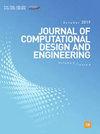通过将可平折折痕图解释为一组扭转图而引起的连续变形
IF 6.1
2区 工程技术
Q1 COMPUTER SCIENCE, INTERDISCIPLINARY APPLICATIONS
引用次数: 0
摘要
在折纸学的研究中,提出了各种参数化方法来设计几何条件下的平折折痕图。每种设计方法都有助于通过操纵参数找到理想的折痕图,例如具有优越工程性能的折痕图。另一方面,要使其他折痕图连续变形,则需要用这种参数化方法对折痕图进行一次重建;然而,这一反问题的研究较少。本文是解决这一问题,实现可平折折痕图参数化变形的基础研究。给定的折痕图案被解释为由扭曲折叠图案组成的网络,可以通过现有的参数化方法——基于扭曲的设计方法来生成。然后,通过操纵参数,使折痕图案变形。重要的是,任何在边界上没有连接两点的折痕线的可平折折痕图都可以被定位,并且局部保证变形的折痕图具有不相交的折痕线和可平折性。提出的方法有助于增加折纸变化的变形,现有的折痕模式。本文章由计算机程序翻译,如有差异,请以英文原文为准。
Continuous deformation of flat-foldable crease patterns via interpretation as set of twist-patterns
In the study of origami, various parametric methods have been proposed to design crease patterns under geometric conditions for flat-folding. Each design method contributes to finding a desirable crease pattern, e.g., one with superior engineering properties, by manipulating parameters. On the other hand, to continuously deform other crease patterns, it is necessary to recreate it once with such a parametric method; however, this inverse problem is less studied. This paper is basic research to solve this problem and to allow parametric deformation of flat-foldable crease patterns. Given crease patterns are interpreted as networks consisting of twist-folding patterns that can be generated by an existing parametric method named Twist-based design method. Then, by manipulating the parameters, the crease pattern is deformed. Importantly, any flat-foldable crease pattern having no crease line connecting two points on the boundary can be targeted, and it is locally guaranteed that deformed crease patterns have non-intersecting crease lines and are flat-foldable. The proposed method contributes to increased origami variations by deformations of existing crease patterns.
求助全文
通过发布文献求助,成功后即可免费获取论文全文。
去求助
来源期刊

Journal of Computational Design and Engineering
Computer Science-Human-Computer Interaction
CiteScore
7.70
自引率
20.40%
发文量
125
期刊介绍:
Journal of Computational Design and Engineering is an international journal that aims to provide academia and industry with a venue for rapid publication of research papers reporting innovative computational methods and applications to achieve a major breakthrough, practical improvements, and bold new research directions within a wide range of design and engineering:
• Theory and its progress in computational advancement for design and engineering
• Development of computational framework to support large scale design and engineering
• Interaction issues among human, designed artifacts, and systems
• Knowledge-intensive technologies for intelligent and sustainable systems
• Emerging technology and convergence of technology fields presented with convincing design examples
• Educational issues for academia, practitioners, and future generation
• Proposal on new research directions as well as survey and retrospectives on mature field.
 求助内容:
求助内容: 应助结果提醒方式:
应助结果提醒方式:


